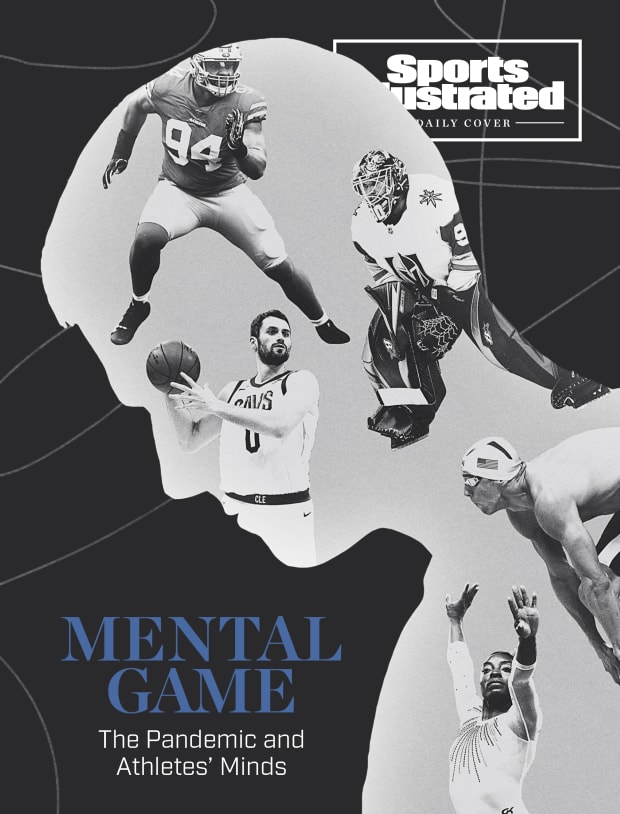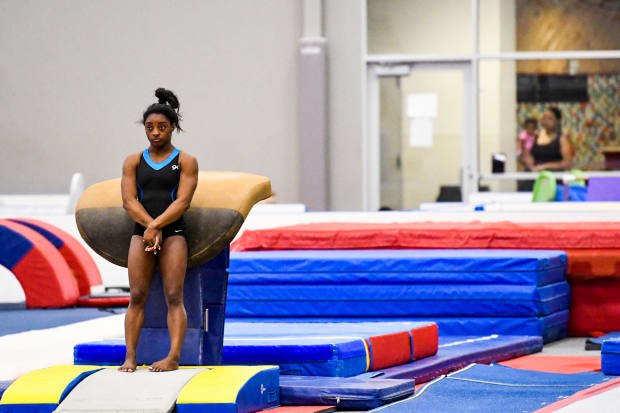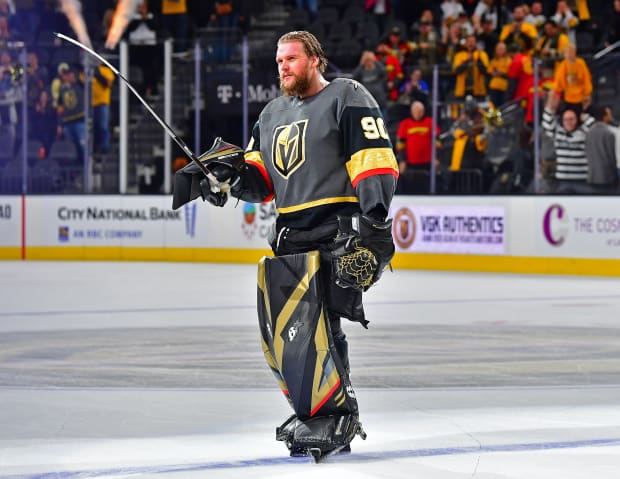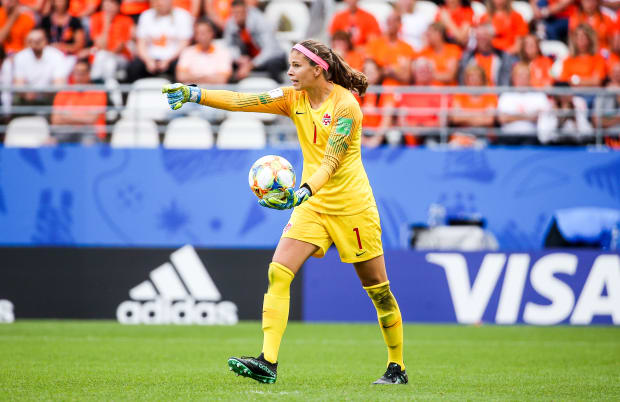Simone Biles is one of many elite athletes dealing with the psychological impact of the pandemic. Across the sports world, athletes are finding different ways to cope.
Simone Biles is alone, thinking. She has been for weeks. “You have those doubts,” says the world’s most decorated gymnast. “Can my body do another year? Can I do another year?” Hunkered down in her home in Houston, she cried when she heard the 2020 Olympics were postponed. Her career was supposed to end in three months, in Tokyo. Now it’ll be another 15, if she decides to compete in 2021. She’ll be 24 then, older than any woman who’s won all-around Olympic gold since 1960.
Biles is used to a regimented life, spending seven or eight hours in the gym every day. Now, aside from picking up curbside Sunday-night dinners from her mom and video-chatting with teammates two or three times a week, her greatest sense of routine comes from walking her French bulldog, Lilo, and going grocery shopping.
“I knew mentally [social distancing] would be harder than physically, because your coaches will prepare you for your competitions whenever you need to be prepared for them,” she says. “But mentally, that’s a whole ’nother ball game.”

A global pandemic like the novel coronavirus isn’t good for
anyone’s mental well-being, Olympic legend or not, but experts say elite athletes face a unique challenge. They may feel anything from anxiety and uncertainty to fear and anger to sadness and even grief over the postponement and cancellation of their competitions. Coping, often through trying to re-create some semblance of routine, is its own challenge.Though everyone encounters some pressure in their daily lives, a world-class athlete experiences more than most—and at a higher-stakes, more public level. Many have learned to keep their emotions bottled up so they can be seen as “mentally tough” to coaches and fans. “[People] don’t get that we have anxiety, that we break down,” Biles says. “They just think we’re perfect.” So when a crisis derails their dreams, that mounting pressure has the potential to overflow, releasing a torrent of emotions.
“It can really mimic the grief and loss process that people experience when they lose a loved one,” says Kensa Gunter, a licensed clinical and sport psychologist in Atlanta who also serves on the U.S. Olympic and Paralympic Committee’s new mental health task force, formed in February.
Greg Harden, the University of Michigan’s executive associate athletic director and director of athletic counseling, who’s counseled the likes of Tom Brady and Michael Phelps, draws the same comparison. “There’s a tremendous sense of loss. It’s like losing a loved one, when you take sports away,” he says. “Because sports may have been the stabilizing force in my universe.”
Phelps, a staunch mental health advocate who has survived suicidal thoughts, has echoed experts’ concerns—and taken them a step further. “I really, really hope we don’t see an increase in athlete suicide rates because of this,” he told NBC in March. “Because the mental health component is by far the biggest thing here. This postponement is uncharted waters. We’ve never seen this before. It was the right decision, but it breaks my heart for the athletes.”
For many elite athletes, their sport is their identity, Harden says. After a record-breaking career, including 28 Olympic medals, Phelps opened up about retreating deep into depressive episodes after just about every one of the five Olympics he competed in. The swimming legend said he’d be “flipping out at the uncertainty” of having the Games pushed back a year.
“Everything was headed towards this year,” says Paralympic cyclist Chris Murphy, a two-time world champion. “It’s like the carpet being removed from beneath your feet all of a sudden. It just took a lot of recalibrating.”
Murphy, who was also named to the new USOPC mental health task force, can recalibrate to 2021, and he’s already looking forward to spending more time shoring up his weaknesses on the bike. But San Francisco 49ers defensive end Solomon Thomas doesn’t know what date he’s shooting for and can’t go out and practice in the solitary way a cyclist can. “I would say that our sport is not the best at communicating with us in terms of what’s going to happen,” says Thomas, who has been outspoken about mental health issues. “Like right now we see all these other sports shutting down, but we don’t know whether we’re going to start at a certain time, whether we’re going to have time to adequately train.” (The NFL has said it will release its schedule by May 9.)
The NFL’s vice president of wellness and clinical services, Nyaka NiiLampti, said in a statement that the league is aware of and working to address the potential mental health impacts on players of the coronavirus crisis. “COVID-19 has expanded the number of ‘unknowns’ as well as presented new challenges to all players, even seasoned vets,” she said. “As a result, the NFL, together with the NFL Players Association, have worked to normalize the higher levels of stress as well as increase visibility of the resources available to help everyone manage those stressors," she continued, citing webinars and virtual engagement between players and team clinicians.
Still, the nature of football makes Thomas worry about his peers not having the tools they need to weather a crisis. “Because we’re in football, where it’s such a masculine sport, we’re supposed to be all these tough, strong guys. Guys like to bury that in and then explode.”

***
There’s not much to do right now, Robin Lehner says, but at least the weather’s nice in Vegas. Over the past couple of years, the Golden Knights goaltender has treated his addiction to alcohol and sleeping pills and found the right combination of medicine for his bipolar I disorder. Through it all, his sport, which he can’t play for the foreseeable future, has been his refuge. “Hockey’s always been a safe space for me,” he says. “It’s a place where I can shut off my brain and focus on the puck for a few hours or for the rest of the day.”
Like Lehner, athletes across the world are trying to figure out how to navigate their new lives. Many are creatures of habit. Their schedule might look like: Train in the morning. Nap in the afternoon. Perform at night. Watch film the next day. Re-creating routines while holed up at home is crucial, says Chicago White Sox sport psychologist Jeffrey Fishbein. It can include working out or rehabbing, sure, to the extent athletes are able to from home. But finding regular slots in a day for breathing exercises, reading and writing, Xbox with friends, or even making TikToks, Fishbein says, allows for some sense of normal in a time that’s anything but.

Away from the 49ers’ facility, Thomas is doing his best to form a new routine in Dallas with his parents, girlfriend, and pitbull, Mickey. He’s packing in a lot of TV (everything from new debut Little Fires Everywhere to his old standby, The Office), texting with his therapist and making sure to drink enough water. “Controlling what you can control,” he says. It’s a mantra he lives by after losing his sister, Ella, to suicide in 2018.
Other athletes are adapting to the loss of their sports, too. Stephanie Labbé, a goalkeeper for the Canadian women’s national soccer team and the NWSL’s North Carolina Courage, is social distancing with her girlfriend, fellow Olympian Georgia Simmerling. As they work out alongside each other in Calgary—pleased, in a way, to have more than their expected four days together between January and May—Labbé’s meditating more, escaping into puzzles and catching up with college friends.
Labbé tends to shut herself in when depressed, as she was after the 2016 Rio Games, coming off the high of winning a bronze medal with her team. Which is weird, she says, because now that she’s self-isolated by necessity, she feels closer to the people in her network than ever.
“I can connect with them in different ways and still use them as a support system,” Labbé says.
Her network also includes an independent sport psychologist—one resource the USOPC task force is designed to steer athletes toward. As part of that group, the Paralympic cyclist Murphy advises medical and mental health professionals about how to best work with athletes and coaches in a way that reduces the stigma surrounding seeking help. The cause is personal for him: He spent childhood chronically depressed and, just over a year ago, saw a fellow athlete friend kill herself.
“We don’t get to the top of our sports by ourselves,” Murphy says. “We have coaches. We have mentors. We have other athletes pushing us and helping us. Why shouldn’t that same structure be acceptable when it comes to mental health?”
***

It’s not just those with a history of mental illness or those who have already sought out therapy who the coronavirus crisis has the potential to rattle. Athletes who have never dealt with such issues are also at risk. “All of us are likely experiencing something in the mental and emotional realm that we haven’t experienced before,” Gunter says. She cites changes in appetite and sleep schedules as common emotional responses to a crisis of this scale. Players self-isolating may be struggling with the lack of physical contact from their teammates. They’re likely missing the little moments of connection, the handshakes and hugs that come with playing together, says Fishbein, the White Sox psychologist, calling baseball a “social sport.”
The solution to managing this new normal for athletes may be as simple as accepting that the good days come with the bad. That’s what Lehner is working on. It’s also what Kevin Love preaches. “I think that’s incredibly important, especially when you are trying to be really productive and try to keep the routine, especially during this time because you are going to be cooped up at home, that it is O.K. to do nothing,” says the Cleveland Cavaliers’ power forward, the most vocal mental health advocate in the NBA. “It is O.K. to take a day. It is O.K. to take a few hours to just destress and take your mind off of things.”
Like with athletes’ bodies, the biggest test for their minds may come once this round of social distancing has run its course and sports are back up and running in some capacity. “Once the world starts to move again,” Gunter says, “that doesn’t necessarily mean that the mental health concerns that have elevated during this situation will automatically go away.”
Fishbein would like to see elite athletes—and the rest of us, while we’re at it—use this prolonged pause to get just a little bit existential. “Do I need to live my life a little bit differently? Do I need to look at my own behavior? We’re faced with getting to know our families better,” he says, laughing. It’s about perspective. “When we come back to sport, maybe we react to the bad game a little bit differently, or the missed putt a little bit differently.”
Jamie Lisanti contributed reporting.

Post a Comment
Thanks For Comment We Will Get You Back Soon.